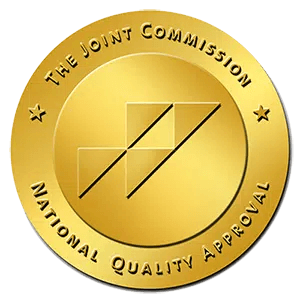
Our Accreditations and Licensure

What is
Accreditation?
Acquiring accreditation for a substance use treatment facility isn’t just a mere formality – it’s a validation that underscores the establishment’s commitment to excellence and adherence to the highest standards of care. Accreditation serves as a commitment to providing quality services that meet the rigorous criteria set forth by regulatory bodies and reputable organizations within the recovery industry.
The journey towards accreditation typically involves a thorough examination of every aspect of a facility’s operations. From the moment a substance use treatment center begins the accreditation process, it commits to its own journey of self-assessment and continuous improvement, striving to align its practices with established benchmarks and best practices in the field.
What Happens During the Accreditation Process?
Accreditation serves as a driving force for continuous improvement, motivating facilities to constantly evaluate and refine their practices in order to better serve their patients and advance the field of addiction treatment.
During the accreditation process, treatment centers undergo a rigorous series of evaluations and interviews, during which their treatment interventions and care policies are scrutinized in detail. This comprehensive assessment delves into every facet of the facility’s operations, from the initial admissions process to the detoxification protocols, therapeutic modalities, and continuing education initiatives.
By subjecting themselves to this rigorous evaluation, facilities demonstrate their commitment to delivering evidence-based and effective treatment for substance use disorders and co-occurring mental health conditions.

Why Do
Accreditations and
Licensure Matter?
With the rise in substance use disorder rates over the past few decades, there’s been a corresponding surge in the number of available treatment centers. However, not all these facilities are equally reliable – which is where accreditation and licensure step in. Think of them as stamps of approval from respected sources, indicating that a treatment center meets stringent standards.
For those seeking help with substance use disorders, the knowledge that a facility is accredited offers a sense of reassurance. It signifies that the staff are highly qualified, treatments are effective, and the environment is safe.
Moreover, accreditations play a vital role in protecting patients. They ensure that treatment centers adhere to regulations and ethical standards, safeguarding patients from potential harm or exploitation. This oversight is instrumental in ensuring that patients receive the best possible care without being taken advantage of.
In essence, accreditations and licensure matter because they signal that a treatment center is trustworthy and committed to providing effective assistance in overcoming substance use and co-occurring disorders. They provide peace of mind for individuals and families embarking on the journey to recovery.
What’s the Difference
Between Accreditation
and Licensure?
Accreditation is a voluntary process where an independent organization evaluates a healthcare facility to ensure it meets certain standards of quality and excellence. These standards often go beyond the basic requirements set by regulatory bodies and may cover areas such as patient care, safety protocols, staff qualifications, and treatment effectiveness. Accreditation is typically sought after by healthcare facilities as a way to demonstrate their commitment to providing high-quality care and to distinguish themselves from others in the field.
On the other hand, licensure is a mandatory process where a healthcare facility is granted permission by a governmental authority to operate and provide specific services. Licensure ensures that the facility meets the minimum legal requirements set by the state or country in which it operates. This may include having appropriate facilities, equipment, staffing levels, and adherence to certain regulations. Without licensure, a healthcare facility cannot legally operate and provide services to patients.

Accreditation and licensure are both important in ensuring the quality and legitimacy of healthcare facilities, but they serve slightly different purposes.
Find the Help and Support You Need
Contact Wellbridge today and start your recovery journey with compassionate, evidence-based, and accredited care.




